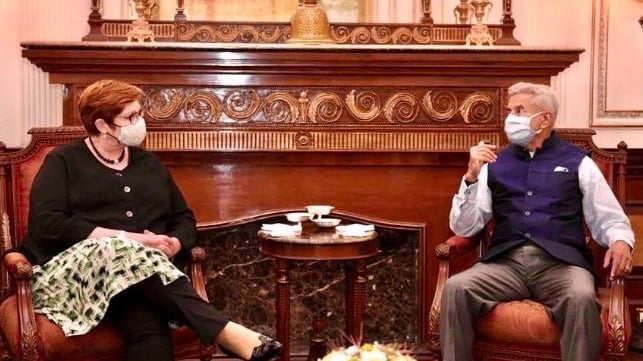India and Australia Outline Vision for the Indo-Pacific

India and Australia have held their first-ever 2+2 ministerial meeting aimed at outlining a shared vision in the Indo-Pacific region. Indian Defense Minister Rajnath Singh and External Affairs Minister S. Jaishankar met with their Australian counterparts in New Delhi last weekend.
India and Australia are part of the Quad group of four countries with shared maritime goals in the Indo-Pacific region, along with the United States and Japan. The Quad has become an avenue for leaders of the four countries to coordinate efforts to contain rising Chinese expansionism in the region.
“Australia and India share a positive vision of free, open and secure Indo-Pacific. Last month we saw the fall of Kabul and the future of Afghanistan remains central concern. In the context of strategic competition in our region, it’s timely that we (India and Australia) reflect on both complementarity and the common outlook that forms the basis of our cooperation in the Indo-Pacific,” said Australian Foreign Minister Marise Payne.
In a joint statement released after the meeting, the ministers agreed to continue boosting cooperation in the maritime domain. This includes deeper engagement between the two countries on maritime domain awareness; expand linkages between maritime agencies; build on existing commitments to combat challenges such as a marine litter and single-use plastic; and enhance joint efforts to counter IUU fishing.
Australia also expressed support for India’s Indo-Pacific Oceans’ Initiative, which aims to promote better coordination and cooperation to ensure security and growth in the region. Part of this includes Australia sending a liaison officer to the Information Fusion Centre-Indian Ocean Region based in New Delhi.

that matters most
Get the latest maritime news delivered to your inbox daily.
Further, the ministers reaffirmed their commitment in supporting a strong, resilient and inclusive regional architecture, with ASEAN (The Association of Southeast Asian Nations) at its Centre. Both countries agreed to continue to work with the East Asia Summit, as the premier forum for leaders’ discussion on strategic issues in the region. They also welcomed the Indo-Pacific Strategy of the European Union.
It was also observed that the quadrilateral cooperation between Australia, India, Japan and the United States, would be the most practical means in resolving Indo-Pacific’s pressing challenges - the COVID-19 pandemic, maritime insecurity and humanitarian crisis in Afghanistan and Myanmar.
